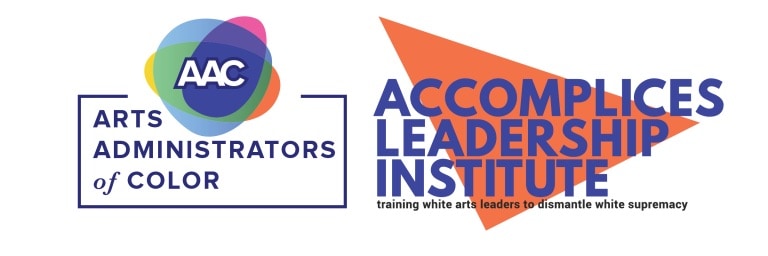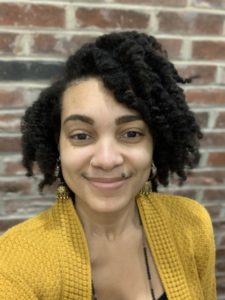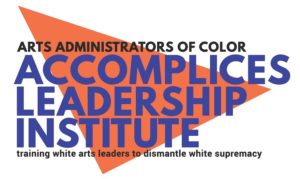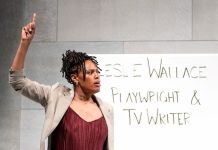Recently, during an interview with Nicole Brewer, founder of Anti-Racist Theatre, I learned about the Arts Administrators of Color Network’s Accomplices Leadership Institute (ALI). As a member of ALI’s national steering committee, Nicole was excited about ALI as an incredible resource of skilled facilitators to support and guide white theatermakers in doing the internal and external work of dismantling white supremacy in the arts.
The Arts Administrators of Color Network, founded by Quanice Floyd in 2016 and headquartered in Washington, DC, is a nonprofit dedicated to providing mentoring and professional development for empowering arts leaders with the tools and resources to advocate for access, diversity, inclusion, and equity in the arts.

I reached out to Amy Smith and Kris Smith, co-facilitators of the first-ever ALI cohort, to talk about ALI’s just-concluded pilot program.
Amy Smith, dance artist and non-rofit business consultant in the arts, centers her work on supporting artists who have been historically under-resourced, specifically women, trans artists, and artists of color.
Kris Smith, a trained social worker, facilitator, and visual artist, works to impact structural change around issues related to healing trauma, anti-racism, and equity.
Ramona: How did the Accomplices Leadership Institute get started?
Amy: It came out of conversations between Quanice [Floyd] and Benjamen Douglas [grants program manager, DC Commission on the Arts and Humanities]. Benjamen, who is white, and Quanice, who is Black, were talking about how the Arts Administrators of Color Network can do all the amazing work that they do with their constituents and members, but the needle isn’t going to move until white arts leaders become involved in working towards undoing racism and dismantling white supremacy in arts organizations. So Quanice had the idea to put together a group of people to imagine a program that would gather white arts leaders to talk about how to become accomplices to their colleagues of color in arts administration. That group, which Benjamen chaired, became the steering committee, and after about a year and a half, the first iteration of the ALI piloted with Kris and me as co-facilitators.
You are calling participants accomplices and not allies.
Amy: Yes. In the first meeting of the steering committee, Quanice talked about how the word ally feels passive and the word accomplice is more active. It’s a word that implies shared analysis and shared understanding and shared purpose. It’s saying, “I am standing with you, I’m doing this work with you. I am standing up to our executive director or our board members and naming racism and white supremacy when I see it as a white person. I’m not letting you as my colleague of color bear the entire burden of being the only one who speaks up when racism and white supremacy show up in our workplace.”
Part of the Arts Administrators of Color mission is to center the global majority in arts spaces. How do you envision the Accomplices Leadership Institute helping to make this reality when we know that power concedes nothing?

Amy: Right now in our culture, we’re in a unique moment—a rare and precious moment. Because of the pandemic and the Black Lives Matter uprising, a lot of predominantly white arts institutions are starting to rethink or question their values and their leadership structure and even their continued existence. It’s going to be really painful and disruptive, but it’s a necessary disruption to lead to systems change and leadership change and an ecosystem that is more just, more reflective of the communities being served by these organizations. In Philadelphia, for example, white people make up only 35 percent of the population, but white people run every LORT [League of Resident Theatres] theater, every foundation. The arts organizations with real power do not reflect the racial diversity that is in my city. And yeah, white people are going to have to give up some power to center the voices of Black and Indigenous folks and people of color.
What is the curriculum of the ALI training? What are you doing in there? What are your expected outcomes?
Amy: Well, Kris and I like to joke that white people really like checklists, so we try to deemphasize checklists and measurable outcomes. We’re trying to encourage folks to sharpen their understanding, to sharpen their analysis, to build a network of other white arts leaders who are interested in and engaged in this work that they can use as support and ask questions of and be in relationship with through these difficult moments, and to become curious adult learners about how racism and white supremacy is showing up for them in their personal lives and workplaces.
You and Kris just worked with your first-ever group of accomplices as part of the American Alliance for Theatre and Education annual conference. As a white woman facilitating training specifically for white folks in the arts who want to examine their personal complicity and white supremacy, what was your personal experience during the program? And did anything surprise you?
Amy: Because I ran a small arts organization for 25 years, a lot of the issues and concerns and stories that were coming up were very familiar to me. So part of doing this work as a white person is the grieving process of understanding how complicit I have been and wanting to be really honest about that with my white peers, so that we can all learn and do better in the future.
Every time I’ve facilitated a group of people, something surprises me. There was a younger theater artist who had had one of the other participants as a high school theater teacher. The first day they had this emotional, really sweet and beautiful moment of realizing the legacy of how impactful theater educators are and can be, and the generational impact and importance of this work towards liberation.
Kris, as a Black woman, what was your personal experience during the training, and did anything surprise you?

Kris: We’re getting surveys back from folks who were in the program. One of the biggest things they commented on was that the space felt very gracious and they felt they could speak openly and they were held and cared for. People were expecting they were going to come and be shamed.
To me, that was surprising and also not surprising. Going into that space, Amy and I knew that people would feel shame, and we were clear about not wanting to use shame as a tool towards trying to move towards anti-racism—because it doesn’t work.
We talk about helping people, when they’re learning with us, to stay in their cortex, stay in the part of their brain that can make judgments and stay within their integrity so that they’re not just reacting to things and they can actually respond.
A thing that seems to happen is that, around race, white people feel stuck—especially arts administrators who may hold a lot of power. And they’re like, “I don’t know what to do and I don’t have power and I can’t change anything.” And we talk about that act of innocence being false. There’s a video we watch where Van Jones talks about how “it’s too late for white people to be innocent.” We problematize that and say: “You have critical thinking skills and you have lots of resources and you have privilege—so how do you utilize that so you’re not discharging your feelings in ways that are not helpful with the people of color around you? And then how do you utilize those things towards the future that you’re trying to build?”
I was very shocked by people waiting for us to be mean to them. But like, I can’t be meaner to you than you are to yourself around this, honestly. It wouldn’t serve the purpose. If we’re trying to get people to move forward, it’s not about meanness. You’ll feel like I’m being mean to you because I’m a Black person in this space without me doing anything sometimes. And so you have to own your own reactions to things and you have to accept responsibility for whatever’s happening for you. Part of our process is supporting people in doing that so they can practice it in the Institute and do it better in other spaces.
Do you and Amy feel that you accomplished the objectives of the training program with this group?
Kris: We spoke a lot about whiteness, we spoke a lot about action planning, we spoke a lot about privilege, a few other topics—but we didn’t get into accountability and repair. The Institute was meant to be in-person, but because of the pandemic we moved it online. That meant it had to shrink in some ways. We also had to be careful about how we’re facilitating folks who are in varying states of what their lives look like right now—how to prioritize people’s humanity in the process of facilitating.
You had a sold-out session at the conference. How big was your group?
Kris: We capped it at 24 people. For the people who showed up and maintained their attendance, it was 22, which ended up being perfect.
Can you give some of the feedback you got?
Kris: Somebody said, “I am more confident to engage in dialogue and open conflict. And I am taking to heart that being an accomplice is a verb and putting my evolving knowledge and perception into action.” Others said they wanted to implement a racial-abuse reporting structure, alongside sexual abuse and safety standards in their organization…work with their board to implement an anti-racism training, anti-racist hiring, and anti-racist pay scales for artists…break down racist training methods that exist and de-colonize the syllabi in the organization that they work with. A couple of folks said they’re going to start doing more affinity group spaces within their work.
There were folks who are leaders of organizations who are really thinking about what it means to hold power at the level that they’re holding power and how to either be transitioning out or hold it better so that they can create an organization and leave a better legacy for when they do transition out of the roles they’re in. As we speak about white supremacy culture or white dominant culture, folks have been creating action plans around how to create spaces that are something different than that. So even in the meetings that they’re having every day and the environments that they’re walking through, how are they thinking about white supremacy culture? How are they trying to work against urgency and perfectionism and either/or thinking and model something different in the spaces that they’re creating?
What tools and resources do you share that accomplices can use to advocate for access, diversity, inclusion, and equity?
Kris: We highlight Sonya Renee Taylor, who runs a website called The Body Is Not an Apology. On her Instagram she has amazing snippets of videos for white folks and talks about how do they engage in work that is anti-oppressive.
Also adrienne maree brown’s book Emergent Strategy is something we pulled from a lot throughout the building of the outline, and throughout the sessions, we use touchpoints from her book.
Amy: I would add Layla Saad. Her book Me and White Supremacy was a resource for us and a tool that we shared out.
We asked folks to learn more about the original inhabitants and perhaps current inhabitants of the land they’re on using a website, native-land.ca. When you type in a place name (or what that place is currently called), it identifies the original stewards of that land.
Art Equity has been a really powerful force, and they have a great resources page on their website that I go back to again and again.
Especially for this group, who were predominantly theater educators, we talked about Nicole Brewer’s work in anti-racist theater.
Kris: And that “White Supremacy Culture” article by Tema Okun and Kenneth Jones is a foundation.
The #WeSeeYou White American Theatre movement has created an incredible document of BIPOC Demands. Do you see accomplices helping to tackle some of the changes that are so clearly spelled out in that document?
Kris: As Amy was saying, once we get to a critical mass of white folks who are thinking about how to be accomplices in action on a moment-by-moment basis, and how to share power and cede power, some of these changes could happen.
Amy: We’re hoping to move the needle, but we know it’s going to be long and hard.
If a theater wanted an ALI training, what does a theater need to do?
Kris: Accomplices Leadership Institute isn’t as much a training as a space for creative reflection, a space for being challenged, a space for people to be very engaged in trying to think of the ways that they’ve been and the ways that they want to be moving towards justice, towards anti-racism. We don’t know if you’ll be an accomplice when you leave here, ’cause that is a moment-by-moment thing. But our hope is that if somebody wanted to, they could reach out to us, and then we would try to figure out a way to host an Accomplices Leadership Institute within their city. We have lots of requests coming through right now. We know that there’s energy behind this right now. We want to be able to exist beyond this moment. So we want to be really intentional about how we move forward.
Kris, any closing thoughts?
Kris: We encourage folks in the ALI space to speak in drafts, to know that they can come and say what’s on their mind and it doesn’t have to be this perfect, perfect thing. And they can do that in this particular space because it’s with white peers, and they won’t be having to consider about whether or not they’re going to be harming people of color in the space.
Amy, your closing thoughts?
Amy: As a white person engaged with this work, I’m so grateful to Quanice for having this idea and bringing this amazing steering committee together and introducing me to Kris. We started planning this program a year and a half ago, and now we’re in the middle of COVID-19 and white people really seeing and understanding the impact of racism and white supremacy in our culture. It is and feels really intense. I’m trying to practice responding to the crises of my time with my best self and creating healthier communities in the spaces that I’m in.
Let me congratulate you on the wonderful work that you’re doing, and I so appreciate your taking time to talk with DC Theater Arts.
To find out more about the Accomplice Leadership Institute or sign up to be on the ALI email list, click here.
“Anti-racist theater and the #WeSeeYou movement: A Q&A with Nicole Brewer” by Ramona Harper
“The #WeSeeYou White American Theatre movement is ready to end a battle it didn’t start” by Ramona Harper
Amy Smith is a dance and theater artist, educator, and facilitator. She works to dismantle oppressive structures in nonprofit organizations and other groups so that artists and low-income folks can achieve collective liberation. She does this through financial well-being workshops, consulting with artists and arts organizations, co-facilitating anti-racism sessions, and as a dance and theater educator. Amy co-founded, co-directed, and performed with Headlong, a dance company that transformed into a community arts organization over 25 years. She left Headlong in 2019 to pursue freelance work.
Kris Smith, MSW (they/she), uses their training as a social worker, experience as a justice-oriented facilitator, and sensibilities as a visual artist in facilitating group spaces that prioritize creative reflection. In addition to their work with the Accomplices Leadership Institute, after spending 14 years facilitating and working with youth leaders in New York City and Philadelphia, Kris now works primarily with adult leaders as an Organizational Development Consultant with Dragonfly Partners, as co-founder of Healing Our Work, and as a Trainer and a certified Trauma-Competent Professional through Lakeside Global Institute. Kris also co-facilitates Women of Equity, a fellowship supporting women of color in Philadelphia-area organizational leadership positions who are working to impact structural change in their organization around issues related to anti-racism and equity. In all of these roles, Kris supports change makers and their organizations to align their values with their everyday practices and systems in an effort to create the liberatory futures that they hope for.





